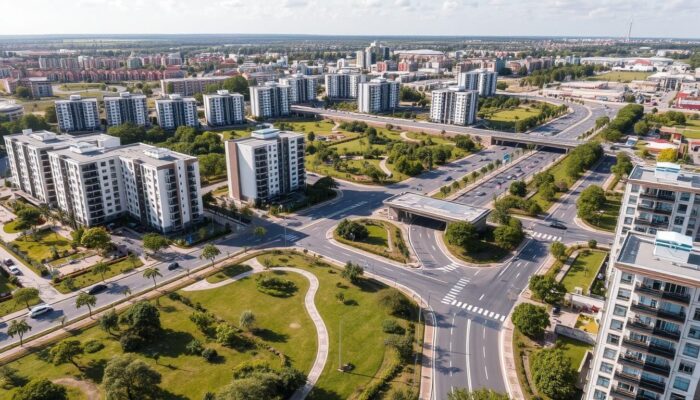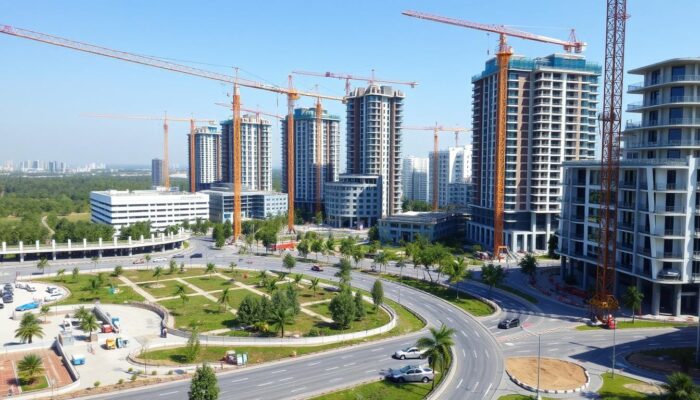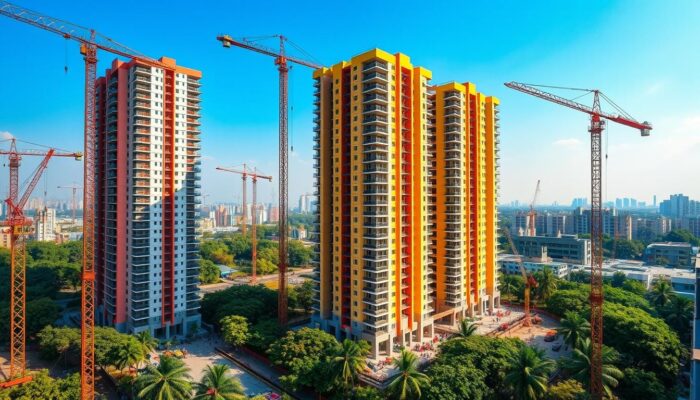The Role of HRERA in Real Estate Development
The Haryana Real Estate Regulatory Authority (HRERA) plays a pivotal role in regulating the real estate sector in Haryana. This authority is responsible for ensuring that real estate developers follow guidelines, uphold transparency, and meet the standards set for the industry. Among its many functions, HRERA’s primary focus is on improving the delivery of external development services. These services are essential for the completion and long-term success of real estate projects, which rely heavily on the government’s involvement in managing infrastructure.
HRERA’s guidelines help maintain order in a growing sector where developers, government agencies, and buyers all need clear frameworks to ensure that new projects meet regulatory standards and timelines. The authority plays a major role in ensuring that these projects are executed in an efficient and compliant manner, enhancing the real estate market’s credibility and reliability.
Why External Development Services Are Crucial
In any real estate development project, external services like roads, water supply, sewage, and power are foundational. Without these essential services, even the most meticulously planned projects can face setbacks or become unlivable. HRERA emphasizes that these services should be handled by the government to avoid delays and complications that developers may face in dealing with infrastructure themselves.
When infrastructure is delayed or underdeveloped, it can affect the marketability of properties, lead to buyer dissatisfaction, and impact overall project completion. These services are not only about convenience—they are critical to the functionality of any real estate development. The regulatory body stresses that smooth coordination between developers and the government is key to providing these services on time and within budget.

Enhancing Infrastructure with Government Support
One of HRERA’s key objectives is to work towards improving the infrastructure of Haryana by emphasizing the importance of government support. External development services like sewage systems, roads, and water supply cannot be managed by private developers alone. A coordinated effort between the government and developers ensures that these services are provided seamlessly throughout the development process.
HRERA’s guidelines also encourage the government to speed up the approval process for external services. Timely approvals are essential for developers to meet project deadlines and maintain a steady cash flow. The government’s role in financing and facilitating the development of infrastructure directly impacts the success of these projects, ensuring that developments meet the necessary living standards and attract potential buyers.
Government’s Role in Infrastructure Development
Government support is essential for real estate development, and HRERA recognizes that the provision of external services is not a task for developers alone. The government is responsible for offering financial assistance, simplifying approval procedures, and providing the necessary resources for infrastructure development. Delays in these areas can create significant obstacles for developers, preventing them from meeting deadlines and adding costs to their projects.
HRERA’s role here is to encourage the government to prioritize the provision of these services, ensuring that developers and homebuyers alike benefit from well-planned and executed infrastructure projects. By advocating for financial incentives, faster approvals, and a more efficient development process, HRERA helps foster a better real estate environment in Haryana.

Addressing Infrastructure Challenges
Real estate developers often face several challenges when providing external services. These include issues related to funding, regulatory approvals, and environmental concerns. HRERA’s guidelines are designed to address these challenges by providing a framework for collaboration between developers and government agencies.
Developers are encouraged to plan their projects well, engage with stakeholders early, and navigate the regulatory landscape efficiently. The regulatory body’s focus on resolving these common challenges makes it easier for developers to carry out large-scale projects while ensuring that external services are provided on time.
Key Recommendations for Developers
To ensure the success of their projects, developers should adhere to HRERA’s guidelines, focusing on proper planning, effective stakeholder management, and proactive coordination with government agencies. These steps can help mitigate delays and roadblocks in the development process.
Additionally, developers are encouraged to be transparent in their dealings with buyers, government agencies, and contractors. Transparency in managing infrastructure services and project timelines builds trust and ensures smoother communication between all parties involved, which in turn contributes to faster project completion and satisfied homebuyers.

Developer and Government Collaboration for Successful Projects
Collaboration between developers and the government is crucial to meeting project deadlines and ensuring infrastructure development progresses without hindrances. HRERA encourages this partnership by emphasizing financial support and streamlined approvals. Government involvement in facilitating essential services is key to ensuring that real estate projects meet the growing demand for housing and commercial space in Haryana.
Additionally, a successful partnership can also result in long-term benefits for both developers and homebuyers, ensuring that projects are completed on time and meet the necessary standards for infrastructure and sustainability.
HRERA’s Vision for Sustainable Development
HRERA’s guidelines are designed not only to streamline development processes but also to promote sustainability in the real estate sector. By ensuring the timely delivery of services like roads, water, and sewage, HRERA fosters an environment that benefits developers, homebuyers, and the overall community.
The authority’s focus on sustainable development means that developers are encouraged to prioritize eco-friendly construction practices, efficient resource use, and long-term infrastructure solutions. This approach is expected to have a positive impact on both the local economy and the environment, ensuring that new developments are well integrated into existing urban areas while promoting growth in a sustainable manner.
For more information visit
FAQ
What challenges does HRERA address in infrastructure development?
HRERA’s guidelines identify challenges like regulatory delays, funding constraints, and environmental concerns that can prevent the timely provision of external services. The authority emphasizes the need for government-developer collaboration to address these obstacles effectively.
What does HRERA recommend for developers?
HRERA advises developers to follow its guidelines, engage with stakeholders, and manage infrastructure services proactively. Proper planning and coordination can help developers overcome common infrastructure challenges and meet project deadlines.
What role does the government play in supporting infrastructure development?
The government is responsible for providing financial assistance, simplifying approval processes, and collaborating with developers to ensure that essential external services are delivered efficiently and on time.
How will HRERA’s guidelines impact the real estate industry in Haryana?
HRERA’s guidelines will help streamline infrastructure development, making it easier for developers to complete projects on time. This will lead to higher quality of life for homebuyers and contribute to the growth of a more sustainable real estate sector.
What are SEO-relevant keywords related to HRERA’s guidelines?
Important keywords include “real estate development,” “infrastructure services,” “developer collaboration,” “government support,” and “regulatory guidelines.

